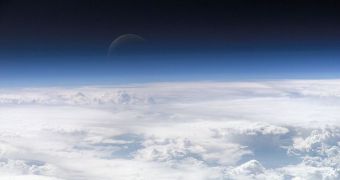The basic chemicals making up the things that allow for life on our planet – the atmosphere and the oceans – may have come from outer space, and be of extraterrestrial origins. The assessment belongs to a group of researchers from the University of Manchester, in the UK, and University of Houston, in the United States. They say that the chemical elements are highly unlikely to have come out of the Earth's core, as previously suggested. More likely, they arrived on the planet aboard comets and asteroids, and accumulated in the current concentrations over billions of years.
The new report appears in the latest issue of the top journal Science, published earlier this week. If the conclusions are supported by additional data, then it could be that the classic images in textbooks, which show the early Earth's volcanoes spewing huge clouds of chemicals onto the surface, will need a little airbrushing. The team says that eruptions and other tectonic activity indeed had a small contribution to the creation of the primeval atmosphere, but add that they were not the main contributors by far.
Evidences are mounting that wandering celestial objects were behind the large concentrations of oxygen and hydrogen on our planet. In the new experiments, which were funded by the Natural Environment Research Council (NERC), the research team analyzed samples of volcanic gases, collected from selected locations around the world. The group, comprised of Dr. Greg Holland, Dr. Martin Cassidy and Professor Chris Ballentine, used groundbreaking analytical techniques for the new measurements, the Science paper shows.
“We found a clear meteorite signature in volcanic gases. From that we now know that the volcanic gases could not have contributed in any significant way to the Earth's atmosphere. Therefore the atmosphere and oceans must have come from somewhere else, possibly from a late bombardment of gas and water rich materials similar to comets. Until now, no one has had instruments capable of looking for these subtle signatures in samples from inside the Earth – but now we can do exactly that,” states Hollan, who is also the lead scientist on the new investigation.
“Many people have seen artist's impressions of the primordial Earth with huge volcanoes in the background spewing gas to form the atmosphere. We will now have to redraw this picture,” adds UM professor Chris Ballentine, who was the director of the project.

 14 DAY TRIAL //
14 DAY TRIAL //